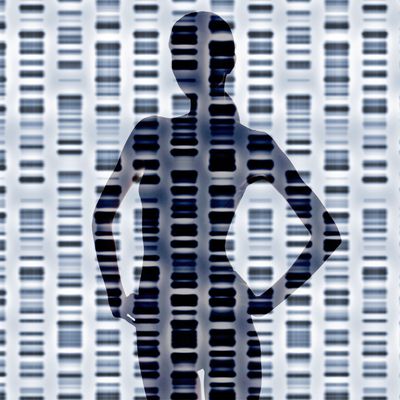
We’re taught that our genes can explain just about everything about us — what we look like, our personalities, our interests, our fears and, of course, which diseases we’re one day going to get. A leopard can’t change its spots, and we can’t change our genes. We put so much stock into this belief that, according to some recent research, learning new information about our genes may warp our memories of our pasts.
In a set of studies published this month in the Journal of Consulting and Clinical Psychology, researchers Matthew Lebowitz and Woo-kyoung Ahn questioned whether simply learning one is genetically at risk of depression could cause a person to reconstruct their recent histories to include more depressive symptoms. Study participants took a fake “genetic test” that resembled saliva kits commonly used by personal genetic-testing companies and were led to believe the “test” would reveal whether they were genetically at risk of depression. Participants were immediately provided with an interpretation of their “results” and then took a survey that measured their recollection of experiencing depressive symptoms in the two weeks prior.
Researchers found that those who believed their genetics increased their risk of depression recalled having experienced more severe symptoms of depression than those who were told they were not at higher risk of depression. The belief held true even among participants who watched an educational video that explained that genes alone cannot cause depression. “Knowledge of genetic information led people to believe ‘If I have a genetic predisposition to depression, I must have had symptoms of depression in my past,’” said Lebowitz, Ph.D, a postdoctoral research fellow at Columbia, who conducted the study while completing his doctoral studies at Yale. (Researchers debriefed all participants after they completed the study, ensuring that they understood that no actual genetic testing had been conducted.)
And yet Lebowitz says he wasn’t “particularly surprised” by the results. After all, depression and other mental health conditions are increasingly understood as caused by brain chemistry or genetics. Beyond that, his previous research has shown that when depression is attributed to biological causes, people tend to think they’ll become more depressed and have a harder time recovering.
Even still, he says he was “troubled” by how genetic information could alter a person’s outlook about themselves, which, in turn, could impact future mental health. For example, most symptoms used for diagnosing depression, from a lack of interest in doing things you used to enjoy to feelings of worthlessness, are self-reported by patients. Doctors then assess these symptoms to make their diagnosis. “If genetic information can distort patients’ memories so they remember feeling more depressed, that’s a potential problem,” he said. It’s a problem he suspects may become reality in the future, as genetic testing for mental health conditions becomes more common.
Ilan Dar-Nimrod, a scientist at the University of Sydney who studies how knowledge about our genetic foundation affects us, says it’s not unusual for people to mistake genetics for fate. His research has shown that “genes take on an almost mystical power to override the many other factors that determine our future.” And, he says, once people learn that a health condition can be attributed to genetics, they begin to think of that health condition — and how to prevent or manage or treat it — differently. “Once genes are perceived to be the cause of a health problem, genes — not behavior — are often seen as the solution,” he said.
A second study by the same authors, this one published in the medical journal Appetite, underscores Nimrod’s point and begs the question countless others have asked: Can knowledge about your genes do more harm than good?
More specifically, Lebowitz and Ahn investigated whether a person’s genetic predisposition to obesity — or lack thereof — affected attitudes and behaviors related to diet and exercise, which can, in turn, affect actual eating habits. They again used a bogus genetic “test,” which study participants were led to believe could reveal whether they carried genes that increased their risk of obesity. Some were then informed they were genetically susceptible to developing obesity while others were told they harbored no such risk — again, based not on actual genetic test results, but through the study’s randomization process.
On a six-question survey following the reveal of their genetic “results,” participants who learned they were not genetically predisposed to obesity underrated the importance of healthy diet and exercise habits on a six-question survey when compared those who were told their genetics increased their risk of obesity or those were told nothing about their risk. Then, when asked to pretend they were preordering lunch from a menu of options, they were far more likely to choose an unhealthy meal —cheeseburger, meatloaf and mashed potatoes, or baked ziti — over a healthier meal — chicken Caesar salad wrap, salad with grilled chicken, and roasted turkey and avocado sandwich — compared to others in the study.
“When people were told they weren’t genetically susceptible to becoming obese, they seemed to think they were off the hook when it comes to worrying about diet or exercise — a belief that could lead to eating habits or lifestyle choices that, ironically, could place them at greater risk of obesity,” said Lebowitz.
Scott Weissman, a genetic counselor at Chicago Genetic Consultants, adds that people “tend to discount other kinds of risk” when they learned they have a gene or genes associated with a certain health conditions. “It’s important to remember that genetic testing provides only one piece of information about your health — other factors, like lifestyle choices and your family medical history, also affect your health,” he said.
Lebowitz notes studies were “limited” because they examined only short-term effects of the genetic feedback since, ethically, the deception about the fake genetic tests had to end. Still, as personal genetics testing becomes increasingly popular, it is important that we keep in mind that we are not necessarily at the mercy of our genes.




